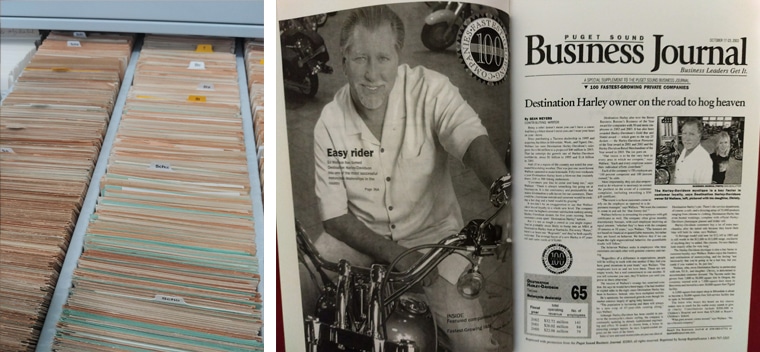Company history books are great tools to preserve and reinforce the culture, mission, and spirit of your organization. Chronicling how it all began and the innovations and perseverance that got it to where it is today can also do wonders for spotlighting the unique values your company provides.
Writing a good history book, however, is much easier when you can incorporate interviews from past and current employees, customers, and leaders who were present during pivotal moments.
Of course, that itself is much easier said than done. Schedules can be tight between other projects and regular duties. The subjects you need may have moved on long ago, may no longer be living, or may not realize the significance of the project and their potential involvement in it.
Even after you reach out and conduct the interviews, there’s still the task of transcribing them, condensing the key points, and figuring out what to incorporate into your book and how. Not to mention the myriad legal requirements you’ll have to navigate in the course of recording your conversations.
In this article, we will discuss the ins and outs of conducting interviews for your company history book, and how to approach the challenges you might encounter.
Who makes for a good interview? And how do you convince them to participate?
When determining who should be interviewed for your company history book, you should focus on key employees and the leadership who were involved in, or at the very least present for, major events that shaped the history of your company.
Past customers who can give insight into the company’s quality of products and services are also excellent choices.

That said, finding these individuals may be a task in and of itself if they aren’t still with the company, and especially if they’re customers.
Your best bet for finding former employees may be reviewing old records and enlisting the help of Human Resources or personnel in their former departments for contact details.
Finding customers gives you even less options and might hinge on whether or not the company still has their contact information on file.
In some cases, these steps may only give you a lead, which you’ll have to follow up on yourself. Don’t be afraid to search on social media, such as LinkedIn and Facebook, if this strategy yields little fruit.
Once you’re in contact with your subject, you’ll need to convince them that participating in this interview will be worth their time:
- Explain the project you’re working on, the significance it has to the company, and what specific relevance they have to it.
- Express that you’d greatly appreciate it if they could share their thoughts or their account of the events in question.
- Stay polite and professional throughout, especially when your subject is a former or current customer you’re asking for a testimonial.
What questions should you ask during the interview?

The exact questions you’ll be asking your subject once it comes time for the interview will, of course, vary heavily, based on the interview’s context.
There are, however, six basic types of questions you should focus on: who, what, where, when, why, and how.
These are known as the 5Ws and 1H.
The 5Ws and 1H are a simple but powerful tool used to guide information gathering in both journalism and academic research by boiling things down to the most relevant facts. It is also applicable to business and project planning, as this article from Airfocus goes over in detail.
As you conduct and plan interviews for your company history book, try to answer the following questions based on the 5Ws and 1H:
- Why are you interviewing this person?
- What are you interviewing this person about?
- When did the events in question happen?
- Where did they happen?
- How did they happen?
- Why did they happen?
- Why does it matter to your company’s history?
Just remember that the questions you prepare should serve as a guideline, not a rigid set of rules. Not only is it perfectly acceptable to branch out from and refine your questions as you receive information, but your interview will end up all the more thorough if you do.
How do you incorporate interview materials into your book?
Transcribing and cleaning up the interview audio is the first step to incorporating interview materials into your book.
Once you have everything written, you can begin sorting what parts of the interview best convey the information you need. From there, you can figure out how to weave them into the narrative where appropriate.
One mistake worth avoiding is to include the entirety of the interview transcript in the final product.
Unless every word of it is critical to understanding the event in question, doing this will only bog down the flow of your company history book, making it more likely readers will either skim or skip past it altogether, defeating the point of including it.

It’s much better and more efficient to summarize points and include direct quotes where they’ll hold the most relevancy and weight. This article from Articulate Marketing and PowerPoint handout by journalism instructor Bobby Hawthorne go into much greater detail on the subject and are excellent resources to help you pull quotes effectively.
Navigating Recording Laws
Incorporating interview materials becomes rather simple once you understand the principles behind good quotes and what information to pull. Navigating the myriad laws surrounding conversation recording is, unfortunately, not so simple.
You’ll almost certainly have to record your interview, whether it’s conducted in person or via phone or teleconference. Whether or not you’re allowed to do so, however, and what procedure you have to follow if you are, depends largely on what state you’re in. Generally, however, the laws operate as follows:
- There are two types of consent for recording in the U.S.: One-Party and Two-Party.
- One-Party consent requires that only one party involved in the conversation give their consent to recording.
- Two-Party consent, despite the name, requires that all participants in a call give their consent to recording.
- Most states operate with One-Party consent for recordings, but a few require Two-Party consent. You can learn more about which states have which consent laws in this article from fireflies.ai.
Calls over state lines can make it confusing as to whose consent you need before you record. To be on the safe side, it’s best practice to always operate under Two-Party consent.
Another thing to keep in mind is to always inform all participants that you are recording, as failing to do so constitutes wiretapping. Secretly recording a call you yourself are not a part of also counts as wiretapping.
In Closing
You should now be prepared to begin collecting interviews for your company history book. Just remember: Focus on colleagues and customers whose accounts will be relevant to the event or message you want to communicate.
Keep yourself on track during the interviews by using the 5Ws and 1H as a guideline. Don’t include all of the interview materials in the final product unless they’re absolutely necessary; instead, pick and choose which quotes best enhance your narrative.
Finally, err on the safe side and always get the express consent of the interview’s subject before you start recording.








